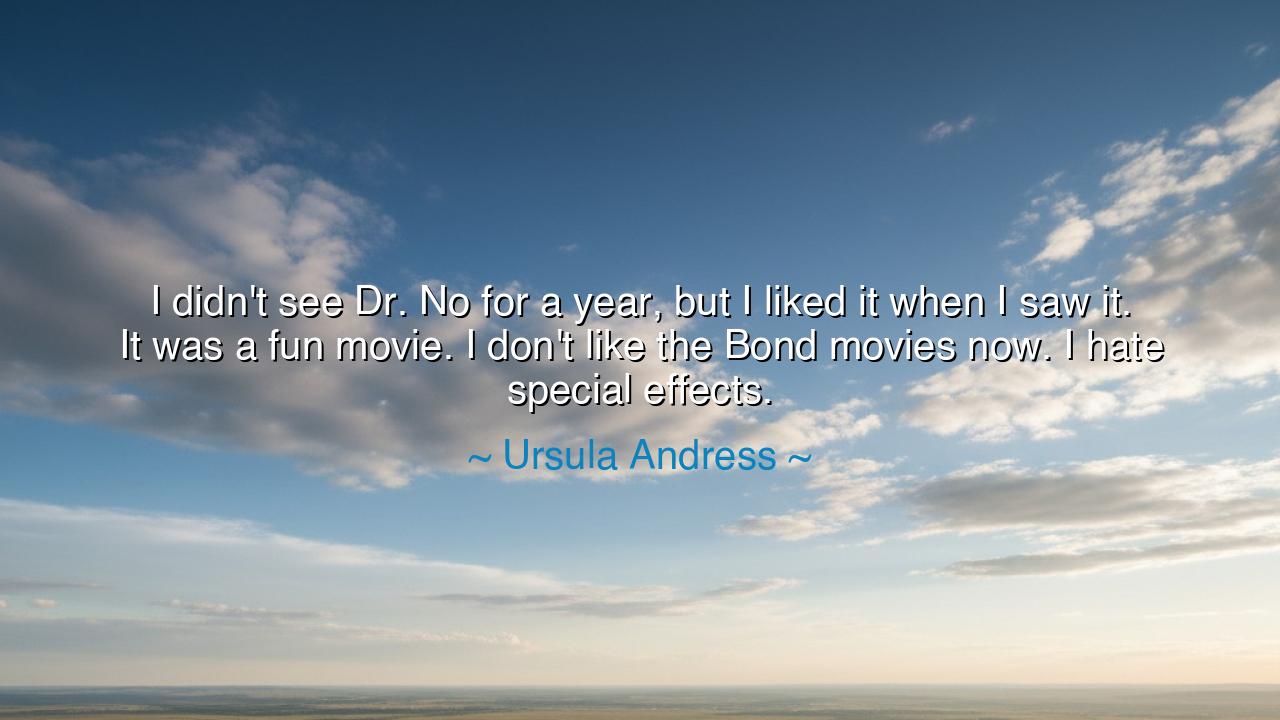
I didn't see Dr. No for a year, but I liked it when I saw it. It
I didn't see Dr. No for a year, but I liked it when I saw it. It was a fun movie. I don't like the Bond movies now. I hate special effects.






Listen closely, O Seekers of Truth, to the words of Ursula Andress, who reflects upon the evolution of the iconic James Bond films with a voice filled with both nostalgia and wisdom: "I didn't see Dr. No for a year, but I liked it when I saw it. It was a fun movie. I don't like the Bond movies now. I hate special effects." In this simple yet profound statement, Andress speaks of a fundamental shift that has taken place not only in the world of cinema, but in the world of human experience—one that moves away from authenticity toward an overreliance on the superficial and the artificial. Her words resonate with the wisdom of the ancients, who valued the human touch in art and creation, reminding us of the timeless beauty of simplicity and sincerity.
In the ancient world, the greatest of stories were told not through the technological advancements of their time but through the truth of the human condition. The epic tales of Homer in his Iliad and Odyssey were not made grand by the effects of the gods, but by the deep emotional resonance of the characters and the timeless themes they explored—honor, love, betrayal, and fate. The heroes of these tales did not need special effects to captivate their audience. They needed only their bravery and heart. Similarly, in Dr. No, the first of the Bond films, it was the raw charm of Sean Connery’s performance, the grit of the story, and the simplicity of its execution that made it a lasting success. It was a movie that, while not overburdened by the excesses of modern filmmaking, still managed to capture the spirit of adventure and the thrill of espionage.
In Andress’ reflection, we see a discontent with the world’s tendency to prioritize special effects over substance. Just as the heroes of old were shaped by their internal struggles, the movies of today, she suggests, have become increasingly obsessed with visual spectacle. The magic of film, which once relied on the art of storytelling, has now become overtaken by the technology that powers it. Andress’ distaste for the current Bond films echoes the lament of philosophers like Plato, who cautioned against the dangers of appearances and artificiality. He feared that artifice, in all its forms, would overshadow the truth and deeper meaning that art should convey.
Consider, O Seekers, the example of Michelangelo, the great sculptor, who sought not only to create beauty but to reveal the truths hidden within the stone. His sculptures, such as the David, are celebrated not for their grandeur or their technical wizardry, but for the way they capture the very essence of the human form—the struggles, the tensions, and the hopes of the human spirit. Michelangelo did not rely on complex illusions or visual distractions. He relied on craftsmanship, truth, and a deep understanding of the human experience. In this way, Andress’ reflection on special effects is a plea to return to a time when art, in all its forms, was driven not by the desire for visual extravagance, but by the desire to touch the soul and stir the heart.
Yet, O Children, this is not a call to reject innovation or progress. The world of cinema, like all art, is always evolving. But Andress’ words are a reminder that substance must never be sacrificed for style. Just as the ancient artists balanced technique with meaning, so too must we ensure that the soul of the work remains at the center of our creations, whether they are films, songs, or stories. Special effects, while they have their place, should not define a film’s worth. They should enhance, not overshadow, the core of the story. It is the emotion, the heart, and the humanity that make a film truly great—qualities that no amount of technology can replace.
So, O Seekers, what lesson can we take from Ursula Andress’ words? It is clear that, while the world may continue to be dazzled by the spectacle of modern media, we must remain grounded in what truly matters. In our own lives, whether in our work, our relationships, or our art, let us strive to focus not on the superficial, but on the meaning and substance of our efforts. Let us not be swayed by the allure of artificiality, but instead let our creations be driven by honesty, emotion, and a deep respect for the human experience.
And so, O Children, remember that the true magic of art—whether it be in film, music, or life—does not lie in the distractions of technology or the flashes of grandeur, but in the simplicity of the human spirit. Seek always to create, to live, and to connect with others in a way that speaks to the heart, not just the eyes. For it is through the truth and beauty of the human condition that we find meaning, and it is through this that we will create works that will endure—not just for their visual effects, but for the depth and soul they convey.






AAdministratorAdministrator
Welcome, honored guests. Please leave a comment, we will respond soon